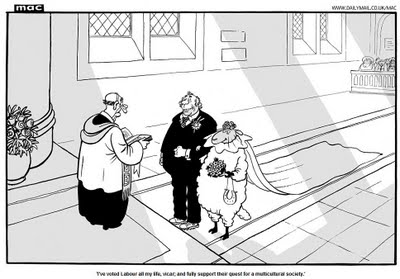A questionable, but ultimately correct decision.
There have been a few recent cases where there has been a retraction, such as when Amanda Platell claimed that the tragic death of Rachel Ward was a direct result of equality and blamed her friends for not going home with her, resulting in the Mail "noting" the father of one of her friends' concerns and removing her article from the website, but with no actual apology forthcoming. There was also the attempts by one persistent individual who complained to the PCC about the ludicrous claim by Carole Malone in a column in the News of the World that immigrants were being given free cars, which Tabloid Watch documented, finally resulting in the paper printing this incredibly terse statement:
"On July 26, our columnist Carole Malone claimed illegal immigrants receive "free cars". We now accept illegal immigrants do not receive such a benefit and apologise for the error".
Something that was definitely worth all the effort involved. Both of these though are examples where either what the columnist had wrote was patently false, or where the newspaper decided not to put up any fight, with the complaint coming quite some time after the original article was published. The Mail knew what a potential precedent the Moir article could set if it decided not to defend itself; as the PCC's lengthy adjudication sets out, it offers no apology whatsoever and defends every aspect of Moir's comment, as was its right. It is also though another indication of just how far removed the world of tabloid newspapers is from that on which they comment: they seem to inhabit a completely different moral sphere when it's them expressing their opinions on someone; when either rivals do it, in the case of "Sachsgate", or when a footballer supposedly brings his entire country into disrepute, then it's perfectly legitimate for them to act as judge, jury and executioner.
If any ruling had set this complaint up to fail, then it was a recent one involving that distinguished inventor of political blogging, Iain Dale, which the adjudication indeed references. In this instance, Dale was for once on the side of the angels, complaining about an almost overt piece of homophobia which appeared in the Ephraim Hardcastle diary column in, naturally, the Mail:
The piece reported that the complainant was on the shortlist of people applying to be the Conservative candidate for the parliamentary constituency of Bracknell. It described him as ‘overtly gay', and referred to an interview he had given to Pink News in which he encouraged its readers to attend the open primary, saying it was ‘charming how homosexuals rally like-minded chaps to their cause'.
Dale felt, quite reasonably, that this breached clause 12 on discrimination. The PCC however has other ideas:
For instance, the newspaper had used no pejorative synonym for the word ‘homosexual' to describe the complainant: this would certainly have been a breach of the Code. Neither had the complainant been outed as gay by the column - which would also have been a breach - as he had frequently and publicly referred to his sexual orientation. Rather, the complaint seemed to be that describing him as ‘overtly gay' at the same time as saying it was ‘charming how homosexuals rally like-minded chaps to their cause' was spiteful to the point of homophobia. This was a more subtle and subjective charge against the newspaper.
In other words, in order to breach clause 12, you essentially have to call a gay person either a faggot, a poof, although considering how relatively soft that term is that might not even not, or a bent cocksucker. Jan Moir was far more subtle, if just as knuckle-headed: Gately was the "Posh Spice of Boyzone", he "couldn't carry a tune in a Louis Vuittion trunk" and "the ooze of a very different and more dangerous lifestyle has seeped out for all to see". In line with the PCC's view of how Dale was described, it found:
it was not possible to identify any direct uses of pejorative or prejudicial language in the article. The columnist had not used pejorative synonyms for the word "homosexual" at any point.
What then about accuracy, also complained about by Gately's partner? How could Moir possibly have not breached Clause 1 with her claims that:
The sugar coating on this fatality is so saccharine-thick that it obscures whatever bitter truth lies beneath. Healthy and fit 33-year-old men do not just climb into their pyjamas and go to sleep on the sofa, never to wake up again.
Whatever the cause of death is, it is not, by any yardstick, a natural one. Let us be absolutely clear about this. All that has been established so far is that Stephen Gately was not murdered.
Despite these assertions, Moir had also covered herself. She also wrote that:
All the official reports point to a natural death, with no suspicious circumstances.and
A post-mortem revealed Stephen died from acute pulmonary oedema, a build-up of fluid on his lungs.
Despite therefore successfully contradicting herself, considering the post-mortem found that it was indeed a natural death, this was all she needed to do. Hence the commission found:
In the Commission's view, it was important to recognise that the article had clearly referred to the official verdict on the cause of death that was available at the time ("all the official reports point to a natural death, with no suspicious circumstances"; "acute pulmonary oedema, a build-up of fluid on his lungs"). It was against this context that the columnist had stated her views on the matter. In her opinion, the events leading up to the death were "sleazy" and showed a glimpse of "a very different and more dangerous lifestyle"; it was also her view that Mr Gately's death was "lonely". The complainant may have disagreed with these claims, and many readers had objected to them, but the Commission felt that these individual judgments did not constitute assertions of fact.
Andrew Cowles also complained under clause 5, intrusion into grief, which although the most obvious and most despicable thing about Moir's piece, was also the least likely point on which the PCC was likely to intervene. It would be ridiculous for a regulator to decide when and when not someone can say something that might cause suffering or pain; instead it ought to be apparent to both the writer and the newspaper itself that doing so when grief is likely to be so raw is far more likely to be intrusive and felt to be unacceptable. To do so the day before the funeral, and less than a week after the death was crude, cruel, unkind and downright ignorant, just as much as Moir's actual article was. For the Mail to so often invoke morality when it clearly cannot even understand such basic human emotions or simple matters of taste, or rather does but nonetheless feels no wider responsibility when it attacks individuals in such a way just shows up its values for what they truly are.
Moir's article, as alluded to above, was actually far cleverer than the views it expressed. It hedged its bets; it covered itself; and most of all, it hid behind innuendo rather than outright accusation. All of this ensured that it didn't breach the PCC's code, whilst also distinguishing it as far worse than just the ravings of a bar-room bigot. It's not a completely apposite comparison, but it reminds me somewhat of Enoch Powell's infamous "rivers of blood" speech; not in the actual outrageousness of the views expressed, in which Powell's were far worse, but because of how Powell hid behind the supposed opinions of others throughout. Moir didn't hide behind the ignorance of others, she instead attempted to hide her own by not being prepared to wrote what she really thought. These are the actions of a coward, not a writer. The tagline on her column, which asks whether you're thinking what she's thinking, is doubly apt, appealing to the lowest common denominator whilst also portraying herself as an ordinary reader holding forth over the topics of the day, something which couldn't be further from the truth.
Despite all this however, I actually agree with the overall conclusion of the PCC. It should not be the job of a regulator to decide what a commentator can and cannot say, as long they do not directly breach the rules on accuracy, as Moir just managed not to. As the Graun's C.P. Scott had it, comment is free, but facts are sacred, or as the PCC say:
Individuals have the right to express honestly-held opinions, and newspapers have the right to publish them, provided the terms of the Code are not otherwise breached.
Moir instead, and the Mail as well, can be held to account in other ways. It's fair to say that Moir is never going to live her column down, and her reputation has been permanently sullied. The Mail has been shown up for the hypocrisy sheet which it is, governed only by what it think will sell rather than what its thundering leader columns and editor actually say it stands for. Finally, despite the sneering of the Mail, it's also shown that Twitter and Facebook can as much be forces for good as they can for bad and general frivolity. Never before have newspapers been held up to such scrutiny as by actual individuals who do have a voice, even if only to those who tend to share their opinions, and this is only going to increase. Will the paper think before publishing something like Moir's column again? Probably not, considering the values by which the Mail lives by, but when it does, and it will, the storm will only likely be even more fierce.
Labels: abuses by tabloids, Daily Mail, Daily Mail-watch, intruding into grief, Jan Moir, Paul Dacre, Press Complaints Commission, privacy, Stephen Gately, tabloid mendacity




